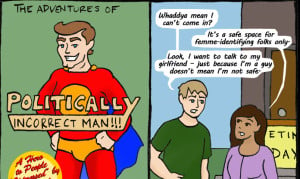
Source: TIME
Growing up in Canada, I got some pretty decent sex ed (thank you Meg Hickling!), and because of my country’s people-oriented medical system, throughout high school, I also had access to free, confidential reproductive health care.
As a result, I avoided a lot of pitfalls common to sexually active American teens.
But that’s the thing: Despite the common idea that teen sex itself is inherently dangerous, what actually leads to a lot of bad outcomes is the product of denying teens accurate information — or condoms and birth control and abortions, or even an adult to talk to.
However, explaining this is a lot more complicated — and a lot less socially acceptable — than simply writing off teen sex as a huge social problem.
Indeed, many otherwise open-minded people seem to take the view that “we all know it’s a bad idea for teens to have sex, but I’m being progressive if I say that we should make protection and information available.”
Take a recent op-ed by a self described liberal, Noah Smith. In it, Smith, an associate professor at Stony Brook University, makes the important point that abstinence-only education is dangerous and ineffective, while comprehensive sex education is not only more ethical, but also more likely to have the intended results.
Yet, with the op-ed titled “Reducing Teen Sex Begins by Cutting Abstinence Class” and ideas introduced with statements like “If what you want is to stop [teens] from having sex,” it’s clear where the author thinks the root of the problem lies.
The view that teen sex is something that needs to be prevented is a common one, especially in the United States where any adult who acknowledges that teens should have a right to express their sexuality is met with a combination of suspicion and disdain.
But there are a lot of reasons the mainstream beliefs about teens and sex do more harm than good, whatever side of the aisle they come from.
What If Teen Sex Itself Isn’t the Problem?
Teen sex is dangerous, right?
I mean, we all know that it leads to STIs, pregnancy, and heartbreak. Plus, what about all those news reports and Facebook posts about how sexually active teens are more likely to be depressed, get bad grades, commit suicide, smoke, and use drugs?
Here’s the thing: Despite the fact that such ideas are passed off as hard facts, many of them simply aren’t accurate.
Sure, some teens will end up pregnant, get an STI, or have an emotionally upsetting experience as the result of sex.
But others won’t, and we rarely talk about those.
That’s a hard thing to accept when every time we turn around another study is trying to demonstrate how sexually active teens are putting themselves at great risk. But in reality, a lot of those studies aren’t legit!
Mike Males, a senior researcher for the San Francisco based Center on Juvenile and Criminal Justice, points out in his book Teenage Sex and Pregnancy that much of the research used to prove that teen sex is dangerous simple isn’t based on good science.
He writes, “The bulk of surveys today are not designed to pinpoint teen behaviors, but to produce the most alarming numbers possible. You do not get funding or grants in today’s highly competitive fiscal climate by finding that teens do not really have burgeoning problems in the areas you are asking for money to address.”
So what is really going on with teens and sex? For one thing, it’s not all gloom and doom.
Here are some findings about teen sex you might have missed amidst the frenzy over-sexting and the dangers of “hook-up culture.”
1. Sex is not a path to delinquency and can teach teens important social skills.
A study out of the University of Virginia found that early sex had no link to drug use, truancy, and violence. Another finding of the study: Sexually active teens may develop better social relationships in early adulthood.
2. Sex can actually be good for teens’ mental health.
Researchers from Children’s Hospital Boston and Harvard found that the sexually active teens in their study “had greater odds of experiencing alertness, happiness, and well-being and lower odds of experiencing anger, anxiety, and stress following sexual intercourse than at other times.”
3. Modern teens are making good sexual health decisions.
The CDC’s Youth Risk Behavior Survey found significant changes in teen sexual behavior between 1991 and 2013. For example, the number of teens who had ever had sex dropped from 54% to 47%. Those who had sex before age 13 fell from 10% to 5%. Those who used a condom the last time they had sex increased from 46% to 59%.
4. Teen pregnancy is at an all-time low.
The Guttmacher Institute reports that rates of teen pregnancy and birth have declined dramatically in the United States since their peak in the early 1990s.
The prevalence of sex-negative attitudes means that these findings don’t get a lot of traction among Americans. But they probably wouldn’t shock a lot of Western Europeans who typically view sexually active teens thorough a much more neutral lens.
Amy Schalet, an associate professor of sociology at the University of Massachusetts — Amherst and the author of Not Under My Roof: Parents, Teens, and the Culture of Sex, has extensively studied American and Dutch views on teen sex. She found that the Dutch parents she interviewed saw teens as capable of having healthy sexual experiences, while the Americans typically assumed that becoming sexually active would be disastrous for teens.
She attributed this to three factors.
- Much more than Americans, the Dutch see a relationship between love and sex. They believe that teens are as capable of falling in love as are adults and so do not assume that adolescents will be damaged by sex.
- Contraception became easily available to Dutch teens in the early 1970s, and abortion is not only accessible, but it is not the controversial issue that it is in the States.
- America has an incredibly high poverty rate compared to most Western European countries. And though negative outcomes of sex are directly linked to poverty, a lot of American see it the other way round. As Schalet explains, “For Americans, the idea of poverty and teen sex are entangled, and there is this notion that if you have sex as a teen, you will turn out to be poor.”
The result of these differing attitudes is that even as Americans see marked improvements in teen sexual health, our teens are still just nowhere near as sexually healthy as are Dutch youth, whose rates of teen pregnancy are four times lower than ours and whose rates of condom use reach 85% percent.
Legislating Teen Sex
Many people would agree that children need special protections from things like sexual violence and exploitation.
But the trouble is that in too many situations, our legal system has missed the mark, and laws that are supposed to protect minors have either been used against them, or have imposed impossible barriers to health.
Here are just a few examples:
- 38 states require parental involvement in a minor’s decision to have an abortion.
- In all 50 states, teens under 17 need a prescription for emergency contraception.
- 20 states make it a crime for minors to send a sexual image, and 18 make it a crime even to receive one.
- Only a handful of states have Romeo and Juliet, or close-in-age, clauses which do not treat consensual sex between teens a few years apart as statutory rape.
- 20 states put juveniles on sex offender registries, even for crimes including sexting and statutory rape.
- Only 22 states and DC mandate sex education.
- But when sex education is taught, 37 states require that information on abstinence be stressed.
Many states also have laws requiring that certain professionals (like doctors, teachers, or social workers) report a child’s sexual activity to the police. This in and of itself is already a troubling practice, but it is not as horrifying as laws like Mississippi’s Child Protection Act of 2009.
This law requires parents to report sexually active minors to the police. Reporting is required even if the child in question is a teen having consensual sex with another teen. Failure to report can find parents charged with child abuse.
LGBTQIA+ Teens Face Unique Challenges of Their Own
A 2011 report from the Office of the Juvenile Defender found that not only are LGBTQ youth disproportionately represented in juvenile justice facilities, but that a lot of these youth enter the justice system after being arrested and charged with a sex offense for having consensual sex with same-gender partners.
Additionally, in an attempt to prevent teens from having sex, some people decide to take matters into their own hands, regardless of what the law says. One example of this is in condoms sales.
Over the years, I have done an activity with my high school students where I ask them to try to find condoms in a variety of locations throughout their New York City neighborhoods. On numerous occasions, my students came back saying that a proprietor had told them they were too young to buy condoms.
This doesn’t just happen in New York. Teens around the country report trying to buy condoms, but being told that they have to produce ID stating that they are either 18 or 21 to do so!
However, that isn’t true. In all 50 states, minors may legally purchase condoms with no restrictions regardless of what the age of consent is in their state it. They don’t need ID, they don’t need to be a certain age, and they definitely don’t need their purchases scrutinized by a shop clerk!
Laws like those mentioned above, as well as vigilantes trying to take matters into their own hands, often get public support, but such restrictions can cause real harm and do little to actually protect kids.
Effects of Fear-Mongering
Not only do sex-negative attitudes about teens and sex affect teens’ legal rights and reproductive health, but youth can also internalize harmful views about sexuality that can impact everything from their body image to their ability to communicate about sex, ensure consent, and practice safer sex.
Plus, when the general view of sexually active teens is a negative one, some pretty awful things can happen under the guise of keeping kids safe of setting them on the right path.
Though sending pregnant girls away to homes for unwed mothers isn’t as common as it once was, sexually active teens (particularly girls) may find themselves forcibly removed from home and sent to a “troubled teen program” simply for having sex. Such programs notoriously lack any oversight and have been the scene of horrific abuse and even some deaths.
One such program, WinGate Wilderness Therapy, makes no attempt to hide the fact that being sexually active alone is enough of a reason for a child to be enrolled. As they explain on their site:
“If you have a troubled teen, you may be dealing with trying to steer them away from promiscuity. This can be a huge problem for teens who don’t fully understand the impact their actions may have on their future… It is important for parents to get involved and help steer their teen away from promiscuity.”
How do they suggest doing this? By sending such teens to their intensive months long program, of course.
To complicate matters further, some kids are more negatively affected by our anti-teen sex attitudes than are others.
As Bianca Laureano, a sexuality educator who works with the Women of Color Sexual Health Network, explains:
“Youth of Color are judged and treated more harshly for being sexually active [than are white teens]. We see this in how programming and prevention/education efforts have completely ignored our youth unless it is to target negative outcomes of sex and sexuality.
Approaches to decreasing unplanned pregnancies exclusively focused on Black and Latino youth can send a negative message. Similarly, while there is funding for HIV education, there is nothing for youth living positive with HIV about enjoying sex and dating. Our communities and our cultures are often blamed for why we are experiencing high HIV rates, unplanned pregnancies, and are victim blamed and slut shamed for our choices.”
Being sexually active does not automatically mean a teen has problems and is in need of help.
But treating sexually active teens as delinquents — and stigmatizing those that belong to certain groups for normal teen choices — can create the very problems many claim to be trying to avoid.
***
Teen sex itself is not a problem, but the conditions we have created around teen sex often make it one.
The fact is, some teens may choose to express their sexuality with another person, and really, as long as they are prepared, being sexually active can be a perfectly normal and healthy part of their adolescent development.
[do_widget id=”text-101″]
Ellen Kate is a Contributing Writer for Everyday Feminism. She’s a health educator, sometime writer, and mom. After doing a BA in Women’s Studies in her hometown of Vancouver, Ellen moved to New York where she did a Master’s degree in Health and Human Sexuality Education. Since then, she has worked at Manhattan’s Museum of Sex, developed sex education curricula in Mumbai, India, and run HIV prevention programs for at-risk teens in the South Bronx. Currently, Ellen teaches human sexuality at Brooklyn College (something she also did at Rutgers University). For the past eight years, her main gig has been coordinating the middle and high school health education program at a school in Brooklyn. Ellen also runs About.com’s LGBT Teens site. Before that, she wrote for Planned Parenthood’s teen website and blogged about sex education for gURL.com. More of Ellen’s writing can be found here. In addition to work-related projects, Ellen spends a lot of time with her 8- and 5-year old kids, tries to find time to run, and dreams of learning another language. Follow her on Twitter @ellenkatef. Read her articles.
Search our 3000+ articles!
Read our articles about:
Our online racial justice training
Used by hundreds of universities, non-profits, and businesses.
Click to learn more




















